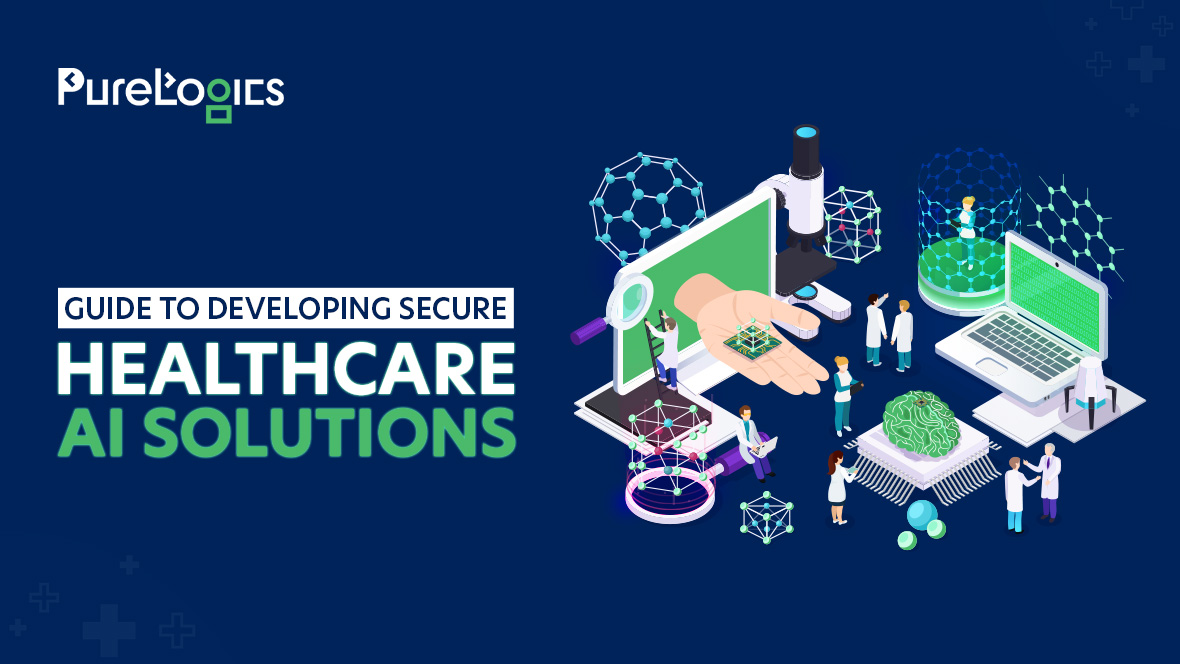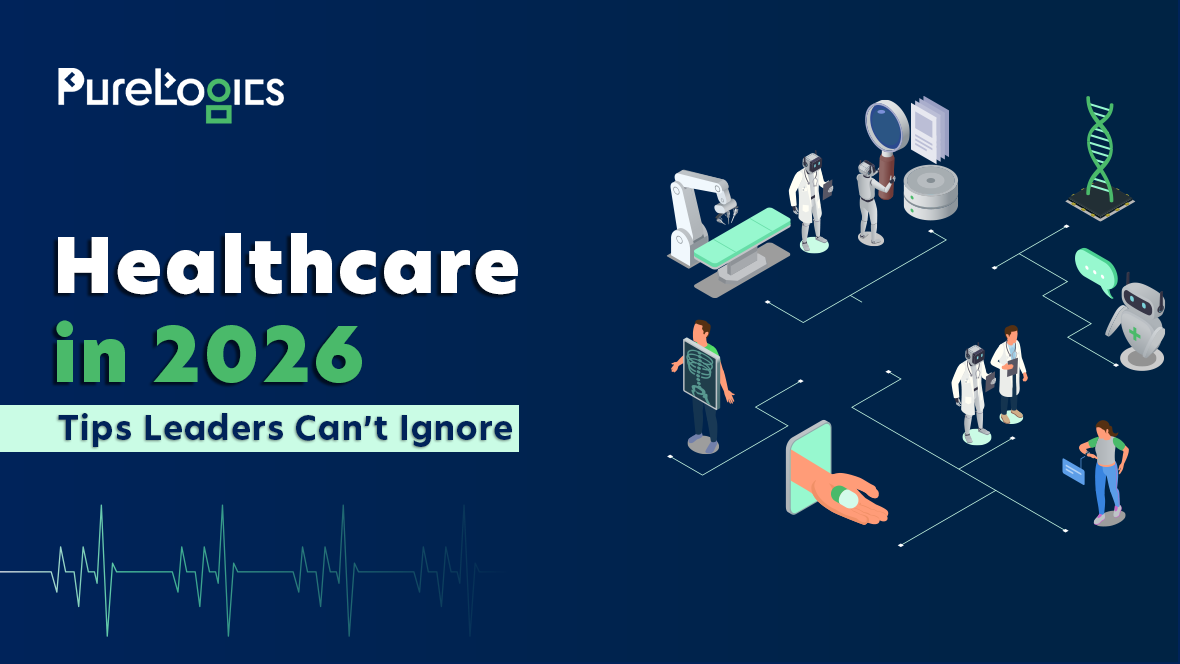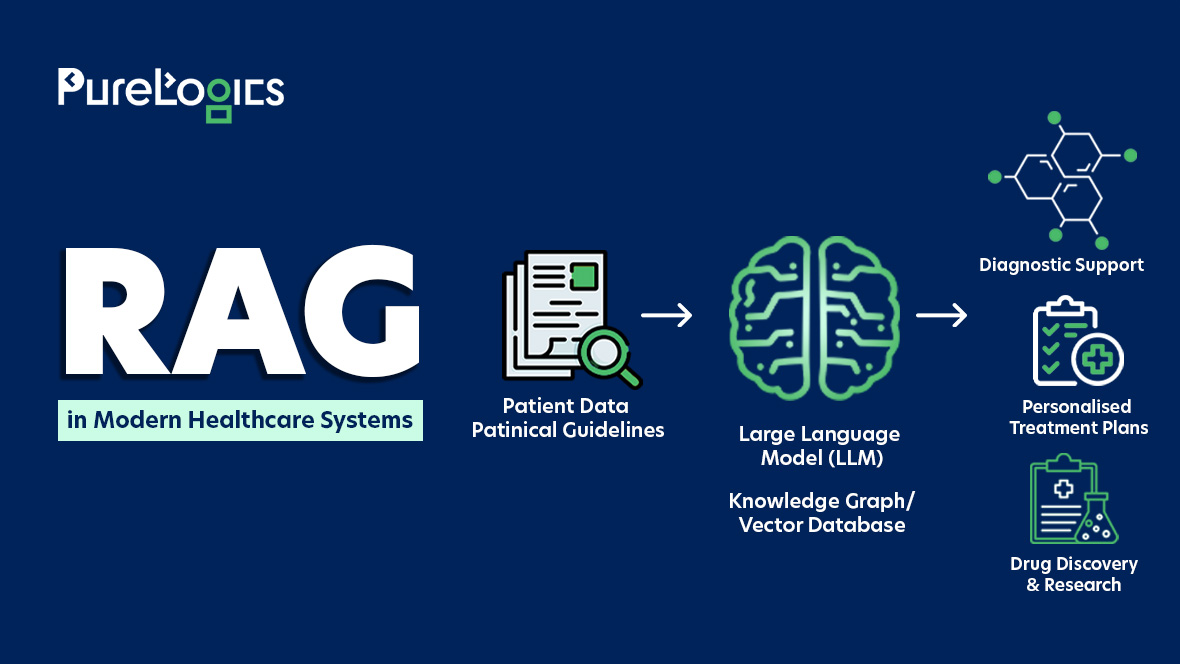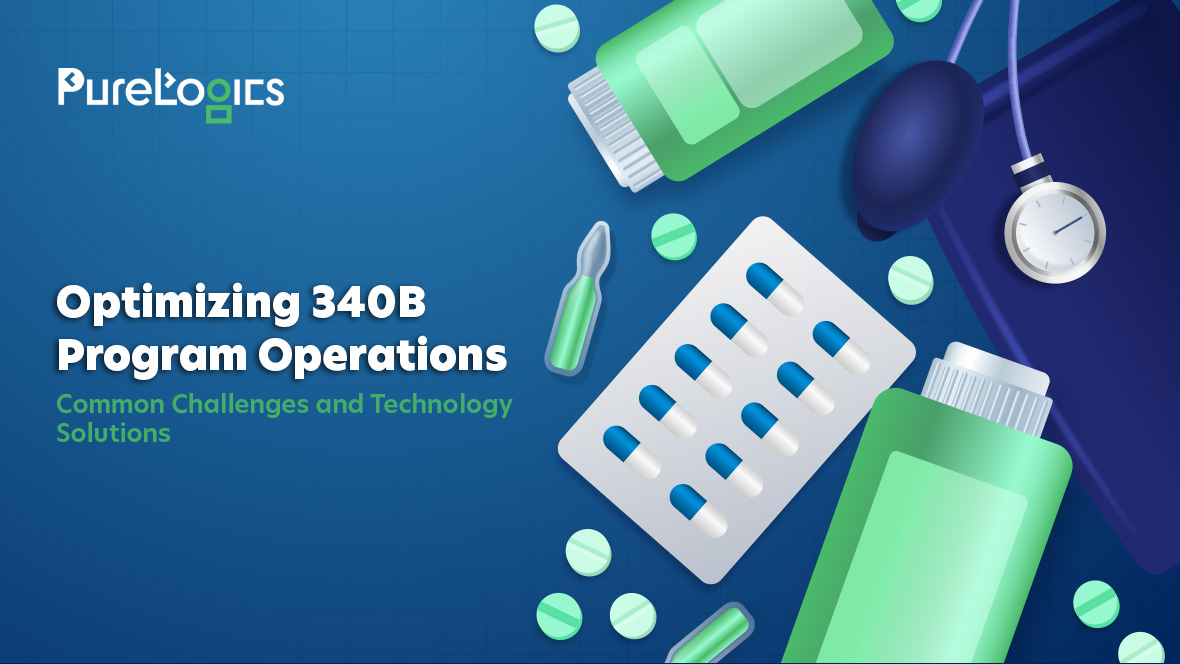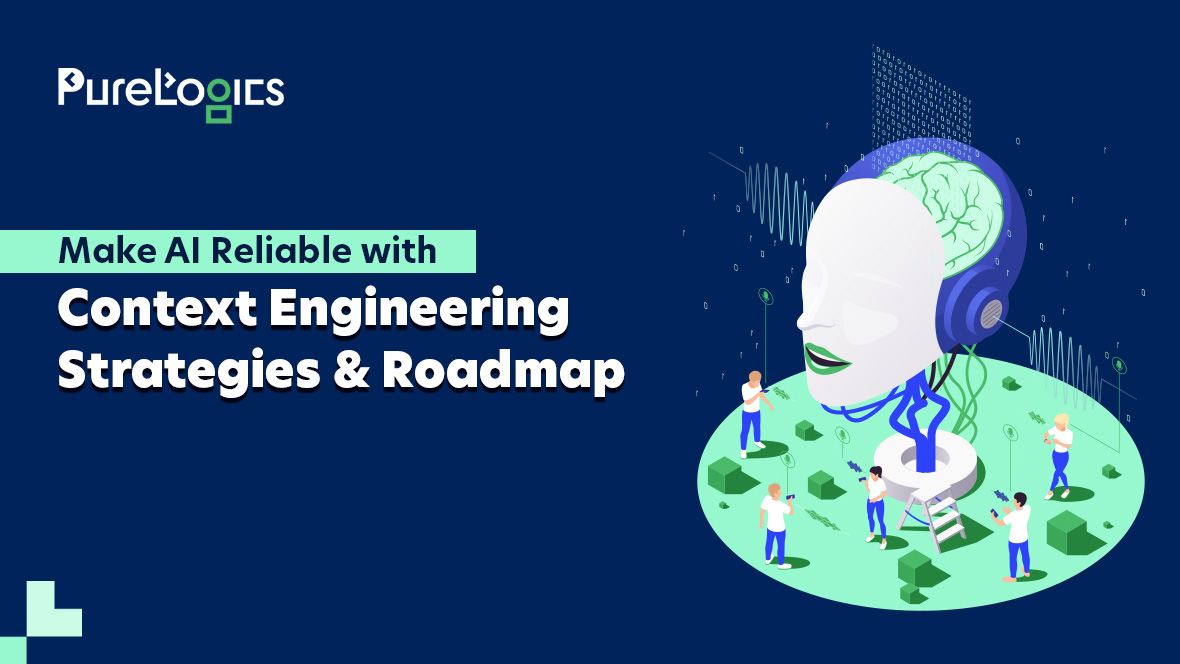Imagine a hospital that invests in a shiny new AI tool that speeds up diagnoses, but weeks later, it’s barely being used. Reason? The doctors were not adequately trained, and the system failed to integrate with existing workflows; now it’s just another expense with no tangible value.
This is not because the AI does not work, but because many healthcare teams don’t know how and where to apply AI. In this blog, we will outline six easy steps to build secure and scalable healthcare AI solutions that deliver actual results. We will also explain the challenges you may encounter during this process and provide guidance on how to mitigate them. If you’re unsure about where AI can best fit, let us enlighten you on that too!
So, without further ado, let’s begin!!
What are Healthcare AI Solutions?
Healthcare AI solutions are intelligent systems that utilize machine learning, natural language processing, and data analytics to automate medical processes. These technologies analyze large amounts of patient data, clinical information, and medical images to assist healthcare professionals in making informed, swift, and accurate decisions.
All in all, the healthcare AI solutions streamline workflows, minimize manual errors, and integrate easily with EHRs and medical devices, along with maintaining compliance with data protection regulations like HIPAA.
The biggest confusion any healthcare provider can face is regarding the implementation of AI in their systems. Indeed, strict regulations, data privacy laws, and integration challenges with legacy systems can cause further difficulties. However, with proper implementation, you can excel in personalized care and utilize data to your advantage. Therefore, providing the best care to your patients while gaining a competitive edge. We will briefly outline where you can use AI in your healthcare ecosystem.
Where Can You Use AI in Your Healthcare Operations?
Healthcare AI solutions have revolutionized healthcare operations by enabling predictive patient care and automating imaging analysis. Thus, offering multiple other uses across diagnostics, operations, and patient engagement that help enhance hospital operations and patient engagement.
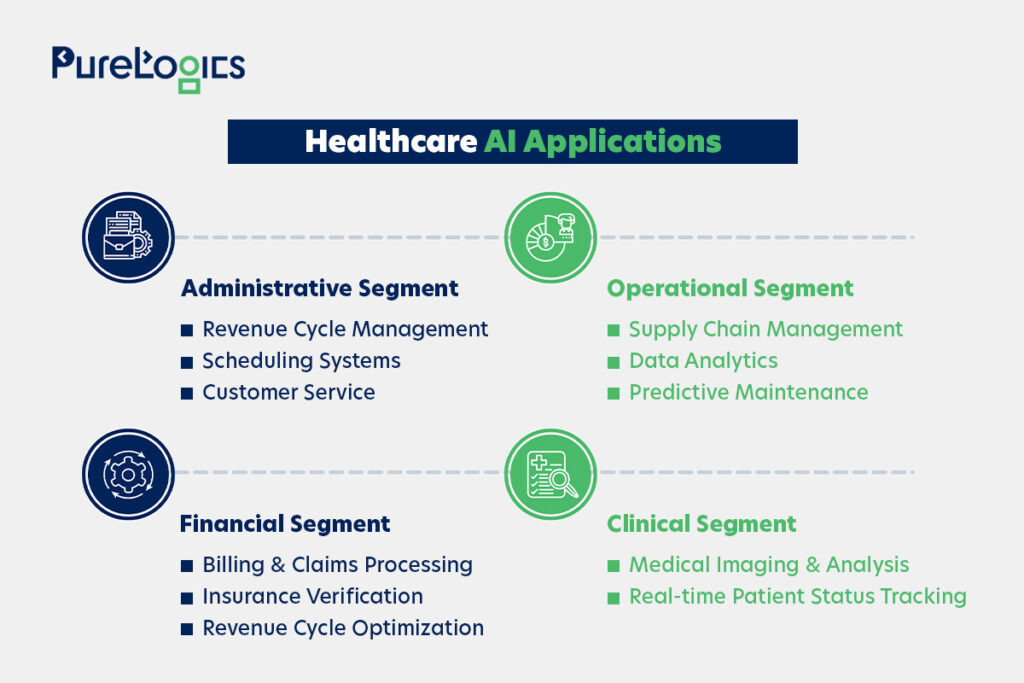
AI in healthcare is freeing up physicians’ time, allowing them to focus on caring for their patients. Some of the areas where you can implement this technology to bring efficiency in your systems are given below:
- Patient Scheduling: AI chatbots can help streamline appointment bookings and reminders. While the smart systems can also help optimize calendars, reducing no-shows. They can also provide answers to common FAQs, offering patients immediate guidance, and 24/7 availability enhances patient engagement.
- Management of Medical Records: You can extract data from unstructured clinical notes and automate EHR updates with the help of tools powered by NLP technology.
- Personalized Medicines: Healthcare AI solutions and tools based on a patient’s genetics, lifestyle, and medical history can offer a customized treatment plan.
- Assess Patient Flow: AI solutions and tools can detect high-risk patients and forecast patient flow, enabling you to set your staffing requirements and inventory needs.
- Clinical Decision Support: AI tools can help your healthcare providers by recommending treatments that align with guidelines and patient history across various departments (radiology, pathology, and dermatology).
- Management of Billing Processes: AI solutions can help make your billing processes efficient by automating coding, assessing claims, and predicting denials. These tools or solutions are also capable of detecting fraud.
- Ensuring Security and Compliance: AI solutions can detect unusual access or data breaches in real-time, supporting HIPAA compliance and audit readiness.
- Drug Discovery: AI speeds up drug development and discovery by finding potential compounds and matching eligible patients with clinical trials.
Now you know about the areas where healthcare AI solutions can be lucrative, it’s time to give you a closer look at AI technologies that play a significant role in this innovation. So, you are better informed before approaching a healthcare software development company.
Types of AI in Healthcare
The healthcare AI solutions are revolutionizing this sector, and some of the common types that are assisting this revolution are given below:
- Machine Learning: One of the most common and broad AI applications is machine learning (ML), which uses pattern-based identification. This allows a machine to learn and apply its experience to similar situations. Common examples of machine learning in healthcare include chatbots for billing and data management within medical devices, such as CT scanners or MRIs.
- Deep Learning: It is a more advanced form of machine learning using neural networks that allow the machines to analyze data inputs and make decisions. The example of DL or Deep Learning can be algorithms that help enhance patient care and clinical outcomes through rapid triage.
- Computer Vision (CV): It is another form of machine learning that helps computers extract information and understanding from images and videos. Moreover, in advanced forms of CV, deep learning can also aid in categorizing images.
- Natural Language Processing (NLP): NLP is another form of deep learning that enables computers to extract data from human language and make informed decisions. For instance, NLP can identify and alert clinicians to patient follow-up needs based on clinical notes.
- Generative AI: It is also a type of machine learning that trains the algorithms to develop content. An example of this is OpenAI’s ChatGPT, which can be used by physicians to create quick clinical notes, generate education materials, and get evidence-based answers to medical questions.
These various types of AI are changing the way healthcare operates, but how do these technologies function in clinical environments? Let’s examine real-world examples to see how clinics utilize AI to reduce burnout and enhance documentation quality.
Real-World Impact: How Did AI Tackle Burnout and Boost Efficiency at Hattiesburg Clinic?
With nearly 300 physicians and 19 primary care locations, the Hattiesburg Clinic in Mississippi faced the challenge of ensuring the smooth operation of its facilities.
Challenge
They were facing high levels of burnout, as clinicians were spending hours on documentation rather than focusing on patient care.
Solution: They Integrated AI Agents
They decided to integrate AI assistants with the hope of streamlining their operations. Soon, the integrated AI assistants helped them automatically transcribe doctor-patient conversations. Furthermore, this helped them organize the notes and add the data to the EHR systems.
Results
This facilitated the healthcare facility in saving time and liberated the staff from manual typing, enabling them to focus on connecting with their patients. In a nutshell, the integration of AI resulted in the following things:
- Increase in clinician satisfaction
- Improvement in documentation quality
- The burnout rates dropped
This is just one example of how healthcare AI solutions can reduce the workload and improve care quality. Moreover, AI can help enhance operations across various departments of a hospital and boost efficiency, and deliver more personalized care.
AI in Healthcare: Department-Wise Use Cases
If you are unsure about how AI can be implemented across various departments, let us explain the process of implementing AI across departments.
- Radiology: In your radiology department, AI tools can act as intelligent assistants to assess the X-rays, scans, CTs, and MRIs. This helps in efficient identification and detection of abnormalities in X-rays, CT scans, and MRIs. Furthermore, the triage and notification support helps the radiologists prioritize urgent cases. This also helps improve the turnaround time.
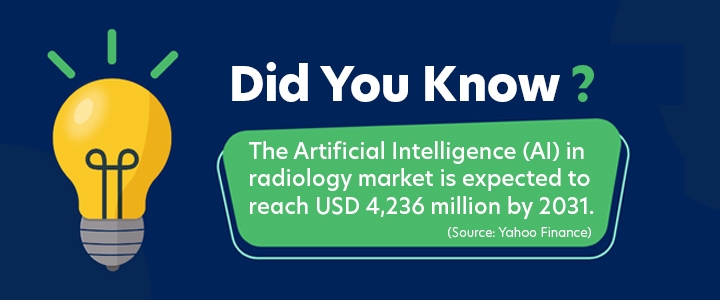
There is no doubt that AI enhances diagnostic accuracy and identifies issues that might otherwise escape the human eye.
- Cardiology: AI aids in the early detection of severe conditions, such as coronary artery disease, by analyzing imaging data, medical records, and reports. Additionally, provides real-time updates and patient insights. Furthermore, AI tools can be integrated with EHRs to track patient progress and identify those who require follow-up. This helps reduce the readmission rate. Additionally, AI-enabled remote cardiac monitoring has been shown to reduce readmission rates by up to 38%.
- Neurology: Healthcare AI solutions enable clinicians to analyze detailed imaging data, such as CT and MRI scans, with greater speed and accuracy. This facilitates the detection of potential abnormalities, including tumors, hemorrhages, or signs of stroke, leading to more efficient diagnosis. Consequently, it enhances collaboration among neurologists, radiologists, and other specialists, allowing the development of more personalized and timely treatments.
- Emergency Department: The overcrowded emergency departments can delay care and increase the risk of errors. AI can help streamline operations by improving coordination among team members and assisting them in prioritizing emergency cases, as well as analyzing patient data. This effectively reduces patient wait time, shortens hospital stays, and ensures that high-risk cases receive more attention. In addition to all this, the AI enhances the patient journey by guiding them through complex hospital processes, thereby boosting satisfaction and improving overall patient outcomes.
Below, we discuss examples of how AI can enhance efficiency in healthcare facilities.
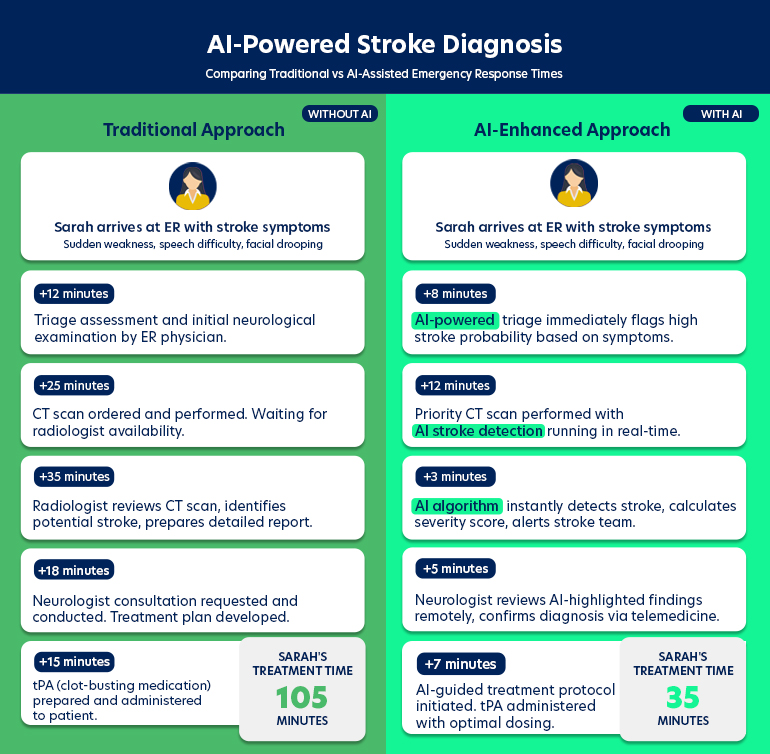
- AI in Ambulances: Another essential role of AI is enhancing ambulance care by allowing real-time monitoring and diagnosis. This helps paramedics detect critical conditions, such as strokes or heart attacks, on the spot. Furthermore, AI improves dispatch efficiency by prioritizing emergencies and allocating resources efficiently.
As AI continues to facilitate frontline care in ambulances, its inclusion in hospital systems is also essential. It is undeniable that healthcare AI solutions promote seamless connectivity between AI tools and healthcare infrastructure. This ensures timely coordination, better decision-making, and leads to improved patient health. Consider this or not, but it is time for healthcare systems to integrate AI technology innovatively.
5 Must-Have AI Healthcare Technology Integrations
AI is more lucrative when it becomes part of the systems that hospitals use every day. Some of the areas where the integration of this technology can bring more efficiency are:
- Picture Archiving and Communication System (PACS)
- Appointment Scheduling Systems
- Vendor Neutral Archive
- Electronic Healthcare Records (EHR)
- Radiology Worklist
- Mobile Communication Systems.
Many hospitals still operate on legacy systems, which can compromise their efficiency and data security. However, there are clear signs indicating that healthcare facilities need to make a shift. Let us tell you about these signs.
Signs You Need Healthcare AI Solutions
As we mentioned earlier, it can be challenging for hospitals to determine their AI needs. If you are facing the issues listed below, consider incorporating AI into your healthcare ecosystem.
- Frequent No-Shows: Your staff is overwhelmed with managing rescheduling and cancellations.
- Data Entry Overload: Clinicians and admin staff is spending more time with paperwork and EHR updates.
- Errors in Billing: You encounter frequent billing errors and experience delays in reimbursement.
- Unaddressed Patient Queries: You always have unaddressed patient queries in your inbox, or your staff is struggling to manage high call volumes.
- Low Patient Engagement: Patients are unable to manage their care or access digital services.
- Inaccurate Prediction: You cannot predict patient inflow or equipment usage leading to inefficient resource allocation.
- Incorrect Patient Diagnosis: Unnecessary delays in imaging or lab results leading to missed opportunities to intervene.
- Inability to Deliver Personalized Care: You have a wealth of data, but a lack of personalized insights, resulting in difficulties in creating a tailored treatment plan.
If you are noticing any of these signs, such as difficulty in managing patient data or delays in diagnosis, then it’s a clear indication that it’s time to have a healthcare AI solution by your side. You will be amazed to know that you can integrate AI into your systems or get a customized AI solution by hiring a healthcare software development company.
6 Proven Steps to Develop Secure Healthcare AI Solutions
Contrary to popular belief, developing a healthcare AI solution is not just about algorithms. It’s actually about protecting sensitive patient data and ensuring reliable performance; in this process, each step, from defining clear use cases to addressing compliance matters, is crucial.
All in all, security, transparency, and clinical validation should be integrated into the very foundation of AI solutions for healthcare. Below is the 6-step process to help you.
Step 1: Identify Your Needs
We are all engaged in this race to integrate AI, yet we often fail to assess the areas where AI can be most beneficial, as well as how AI can help organizations effectively meet their goals.
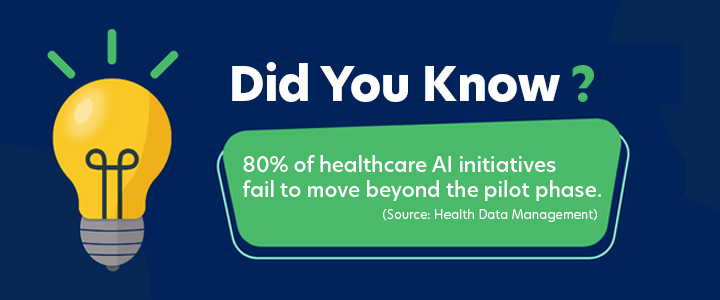
So before jumping into a huge AI mess, it’s essential that you first assess your needs and define your objectives. The two best ways are given below:
Find Your Pain Points: Conduct a detailed assessment of your healthcare facility and find the areas where AI can address the existing challenges. Or areas where you are looking for improvement and efficiency. Some of the common areas where hospitals mostly integrate AI are
- Diagnostics
- Patient monitoring
- Administrative processes
- Personalized treatment
Define Your Objectives: Always remember to set objectives that are measurable and attainable. You can go for a SMART (specific, measurable, achievable, relevant, time-bound) strategy. With nearly 20 years of experience, the common objectives we have seen are improving diagnostic accuracy, minimizing wait times, and improving patient engagement. Additionally, ensure that key stakeholders, such as healthcare providers, IT staff, and administrative personnel, are included.
Step 2: Gather Data
Most people are unaware of this, but AI models are only as good as the data they are trained on. This leads us to the fact that high quality is essential for accurate results. You can start by gathering data from sources like APIs, databases, or user interactions. The next step is to perform data cleaning to eliminate errors that can affect the performance.
Furthermore, change the data into a usable format by scaling or encoding it, taking into account the model’s needs.
Step 3: Choose the Right AI Tools or Partners
Once you have gathered the data, it’s time to search for available solutions.
Explore the AI technologies that can meet your healthcare facility’s needs, such as machine learning (ML) algorithms, natural language processing (NLP), and computer vision (CV). You can assess AI tools based on the scalability and functionality they provide. Additionally, how easily they can be integrated into your existing systems.
Assessing this on your own can be challenging and may yield inconsistent results, so it’s best to select a healthcare solution development company to assist you.
Pro Tip: If you are looking to integrate AI into your healthcare systems, then go for a company that offers AI development services. Moreover, if you are building your solution from scratch and looking to integrate AI, then consider a healthcare software development company.
Before selecting your development partner, ensure you assess their capabilities. You can do that by checking out their portfolio. Alternatively, the best way to evaluate a company’s skills is to schedule a call with them. Afterwards, you can book an interview with relevant developers where you can ask them questions about tech stacks or give them small tasks to evaluate their skills.
Step 4: Plan Integration & Deployment
During the development phase, it is essential to plan the implementation phase as well. This can include timelines, resource allocation, and key milestones. Ensure that you define the roles and responsibilities of each team member to avoid conflicts and delays in project completion.
The healthcare software development company can take care of the entire process, from ideation and development to deployment. They also offer pilot testing to assess the AI solution’s functionality and gather user feedback to make necessary changes before full-scale deployment.
Step 5: Training & Support
It is essential to consider that initial AI implementation may encounter resistance from healthcare staff. But educating and training them can help you leverage the full potential of AI. Many healthcare technology providers conduct workshops and hands-on training to help their clients easily and securely adopt the AI solution.
Although it is essential to establish a support system that can address issues and challenges related to implementation. Additionally, ensure that AI systems are updated based on user feedback.
Step 6: Monitoring and Evaluation
To ensure the perfect working of your healthcare AI solution, you can use analytics to find the areas of improvement and make data-driven decisions. You can conduct periodic reviews to assess the impact of your AI solution. Furthermore, you can add new data and refine the algorithm as required.
Challenges You Can Face In Healthcare AI Solution Implementation
Integrating AI in healthcare is not a simple plug-and-play. It comes with a significant number of challenges and issues that can affect the scalability. But some of the most common challenges you can come across are given below:
Poor Quality Data
Gathering and preparing data during the implementation phase can often slow down the process.
Resistance from Clinical Staff
The adoption of healthcare AI solutions can be complex as healthcare workers may hesitate to adopt AI tools.
Complex Systems
Healthcare ecosystems are complex; that’s why implementing healthcare AI solutions can be difficult, as the solution might need to be plugged into multiple platforms (EHR and scheduling systems, etc). However, a robust, secure, scalable AI solution can help here.
Conclusion
Healthcare AI solutions have the potential to change the way care is delivered. But secure implementation and thoughtful design can help you get an AI solution that properly aligns with your needs. Therefore, it is essential not to rush into AI without robust planning or a clear roadmap, which can lead to wasted resources and time.
At PureLogics, we have a team of healthcare AI developers who are skilled in designing and developing secure, scalable AI solutions. Whether you are starting from scratch or looking to integrate AI into your existing solution, contact us to make a meaningful clinical impact.
FAQs
What are the steps to implement AI in healthcare systems?
You can start by identifying your clinical needs or areas where AI can be implemented. Then gather quality and compliant data, and choose a healthcare AI solution development company that can help you integrate AI, pilot the solution, train staff, and set up ongoing monitoring to ensure safety and compliance.
Who develops AI solutions for healthcare?
Healthcare AI solutions are developed by a healthcare software development company. With years of experience, they are adept at developing HIPAA-compliant AI solutions that are scalable, secure, and ensure smooth operations.
How to make AI HIPAA compliant, especially in healthcare?
To make AI HIPAA compliant, ensure that your patient data is encrypted and access is controlled. Additionally, the data stored and being transferred complies with HIPAA privacy and security rules. You can hire HIPAA-trained developers and conduct regular audits to ensure compliance.
What are the challenges of using AI in healthcare?
The major challenges or risks you may encounter are inaccurate or biased predictions resulting from poor-quality data. Additionally, concerns may arise regarding data privacy and system integration. However, a healthcare software development company can help you mitigate these risks by developing a secure, compliant, tested, and scalable AI system


 [tta_listen_btn]
[tta_listen_btn]
 July 22 2025
July 22 2025

